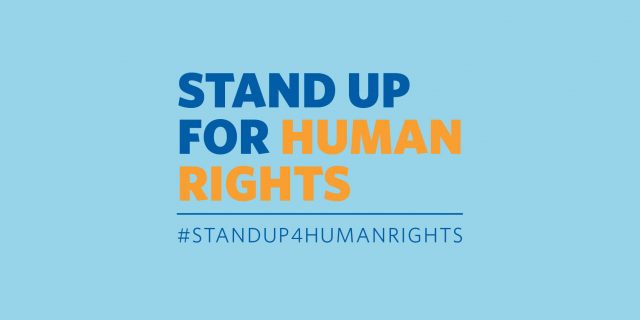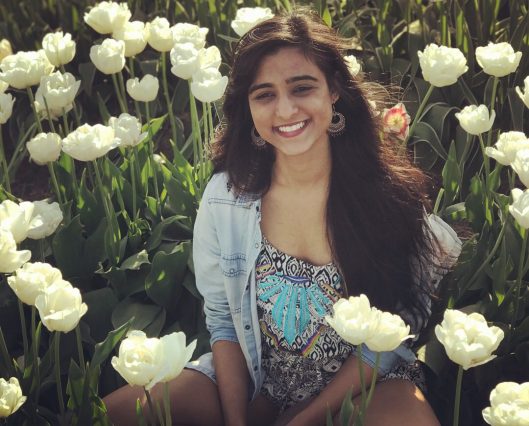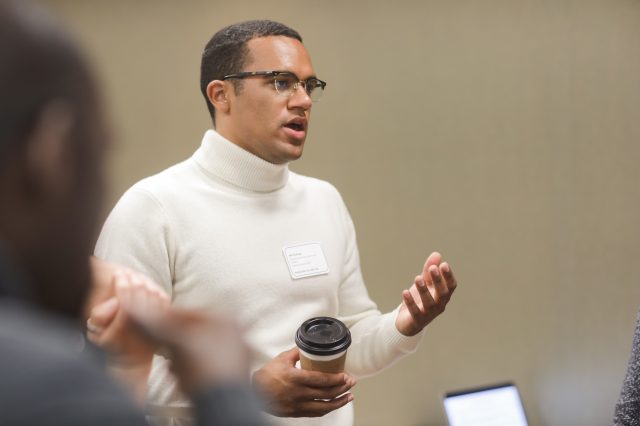By Gabrielle Bonifacio, Communications Assistant (Work-Learn), UBC Equity & Inclusion Office

Every year on December 10th we observe Human Rights Day to commemorate the UN’s adoption of the Universal Declaration of Human Rights in 1948. This monumental document states our inalienable rights as human beings regardless of race, colour, religion, sex, language, political or other opinion, national or social origin, property, birth or other status.
As this year’s theme is Youth Standing Up for Human Rights, we spoke with three students working at the EIO, Nishthaa Lekhi, Lilian Ordera and Will Shelling, to share their perspectives on their work and their experiences with standing up for human rights
How does your work support human rights?
Will: One of the areas of focus for my work this year is supporting racialized staff members.
Nishthaa: I think most of our work centers around awareness. Most of the time, it’s not that people intentionally want to make mistakes, but they do infringe on other peoples space and rights. Most of our work revolves around making other people aware of their space and most importantly, other people’s space.
Will: Everybody wants to be respected, included and cared about. How do we get there? That’s legitimately it.
Nishthaa: It’s quite simple, but people need to be made aware of it, whether it be through telling them how to respect each other’s space to making them aware of others’ differences. I normally joke with my friends that my work is to make people into good people. And a lot of it, sadly, is making people whose human rights or space has been infringed on, comfortable and creating positive or intentional spaces for them.
Most of the time, people are not even aware that their rights have been affected. It’s so normalized that if something happens to me, I’ll be like, ‘oh it’s not a big deal’, but actually, those are my human rights and I should stand up for them. It just trickles down to awareness.

Nishthaa Lekhi, EIO co-op student
What are some challenges you’ve faced at work or in everyday life, regarding human rights?
Lilian: The difficult thing is for most people to realize that they have been disrespectful to other people cause there’s a certain onus and personal responsibility to constantly be mindful. People don’t like to be uncomfortable.
Will: The hardest part of my job is making people realize the subtleties and insidiousness of racism, discrimination and harassment. Because a lot of it is just normalized in the way we do things and the way we work, right? Interestingly, some of my current research is centered on critical discourse analysis and how language is used to frame power dynamics. If we unlearn our language and take an active stance in understanding it, we can really work to support human rights.
Nishthaa: Instilling people with accountability is the hardest part of our jobs.
Lilian: It’s almost like you constantly have to be critical, you have to know how to ask white people these critical questions. How are you showing up for your students of colour or marginalized students in an institution such as UBC? In my experience when you’re talking about human rights, especially in an institution like UBC, a lot of professors are not mindful of that. Because I think it’s one thing to be like, ‘I’m not killing or hurting anyone, or saying racist slurs’. But it also shows up in how you are teaching, how you are talking about people when they are not present.
Nishthaa: It’s also about respecting spaces. Recently, we’ve been doing a lot of intentional spaces, like Get Connected with the Equity Ambassadors. Getting people aware of colonial histories, like how they impact the present and how we’re in a constant circle of perpetuating them through actions that we might not be aware of…I think that is the number one step we have to take for human rights.

Will Shelling, Dialogue & Conflict Engagement Assistant
How do you stand up for human rights and against racism, hate speech, bullying and discrimination?
Will: I would say standing up for human rights is everyone’s duty in order to make sure that the people around us are able to receive their base needs of being respected, included and more importantly, cared for. I strongly believe that human rights is an everyday practice. It’s anything as small as not normalizing sexual violence, to overtly saying that BIPOC folks need to have codified spaces for them to participate in. It also goes into language like retooling and unlearning yourself so you can better support other people. It always starts with you, right? It’s both unlearning and learning and letting other people take the driver’s seat when they need to.
Nishthaa: We’re providing the tools and resources that people need to unlearn these [harmful] things. Most of what the equity facilitators do through the Positive Space campaign and the Through the Lens workshops is basically a deeper dive in helping people realize what they are doing. They help them unlearn or systematically deconstruct [problematic behaviour] so that they have a chance to learn and construct themselves again. Human rights is how you would treat yourself. It’s literally what your mom teaches you; just be kind, be respectful.
Will: Human rights are also intensely simple. It’s bodily integrity in regards to sexualized violence, it’s creating spaces for people to feel respected in. It’s about people’s base needs and how we fulfill them.